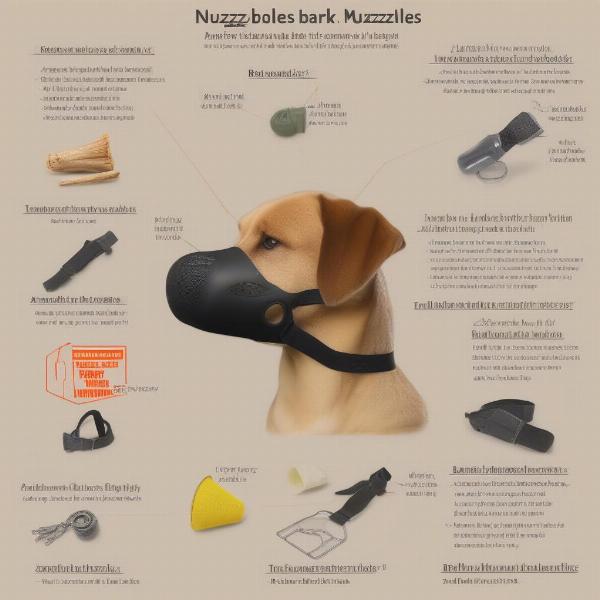Anti-bark dog muzzles are a controversial tool, often misunderstood and misused. While they can be effective in curbing excessive barking, it’s crucial to understand their purpose, limitations, and the importance of responsible usage. Choosing the right muzzle, understanding the underlying causes of barking, and employing positive reinforcement training methods are essential for long-term success. This guide will delve into everything you need to know about anti-bark muzzles, helping you make informed decisions for your canine companion.
Understanding Anti-Bark Muzzles and Their Functionality
Anti-bark muzzles work by interrupting the barking action. Some muzzles physically prevent the dog from opening its mouth wide enough to bark, while others use citronella spray or vibrations to deter the behavior. It’s important to differentiate these from standard muzzles, which are primarily used for safety in preventing biting. Anti-bark muzzles should never be used as a punishment or a long-term solution to barking. Instead, they should be considered a temporary tool to manage excessive barking while addressing the root cause of the problem.
 Different types of anti-bark muzzles
Different types of anti-bark muzzles
Choosing the Right Anti-Bark Muzzle for Your Dog
Selecting the right muzzle is crucial for your dog’s comfort and well-being. Factors to consider include size, breed, and muzzle shape. A poorly fitting muzzle can cause discomfort, chafing, and even injury. Basket muzzles generally allow for panting and drinking, while fabric muzzles are more restrictive. Citronella spray muzzles can be effective for some dogs, but others may find the spray irritating. Always prioritize your dog’s comfort and ensure the muzzle allows for normal panting and drinking.
Addressing the Underlying Causes of Barking
Barking is a natural canine behavior, but excessive barking can be a sign of underlying issues such as anxiety, boredom, territoriality, or even medical conditions. Before resorting to an anti-bark muzzle, it’s essential to identify the reason behind the barking. Is your dog barking due to separation anxiety? Is it reacting to triggers in the environment? Or is it simply seeking attention? Understanding the cause is the first step towards finding a lasting solution.
Combining Muzzle Training with Positive Reinforcement
Using an anti-bark muzzle effectively requires proper training and positive reinforcement. Introduce the muzzle gradually, associating it with positive experiences like treats and praise. Never force the muzzle onto your dog. Instead, encourage your dog to explore the muzzle on its own terms. Combine muzzle training with positive reinforcement techniques to address the underlying cause of the barking. Reward desired behaviors, such as staying quiet or focusing on a command. dog metal muzzle can be a good option for some breeds.
Is an Anti-Bark Muzzle Right for Your Dog?
“Anti-bark muzzles are not a one-size-fits-all solution,” says Dr. Emily Carter, a certified veterinary behaviorist. “It’s crucial to consult with a professional to determine if a muzzle is appropriate for your dog’s specific situation and to develop a comprehensive training plan.” This personalized approach ensures the muzzle is used responsibly and effectively.
Long-Term Strategies for Managing Barking
While an anti-bark muzzle can be a helpful tool in the short term, the goal should always be to address the underlying cause of the barking and develop long-term management strategies. This might involve behavior modification techniques, environmental enrichment, or even medication in some cases. Remember, a muzzle is a management tool, not a cure. gentle harness dogs gentle leader can be a useful tool for managing reactive dogs who might bark excessively.
Conclusion
Anti-bark dog muzzles can be a useful tool for managing excessive barking, but they should always be used responsibly and in conjunction with training and behavior modification. Understanding the underlying cause of your dog’s barking is crucial for finding long-term solutions. Choose the right muzzle for your dog’s comfort and well-being, and prioritize positive reinforcement training. Remember, a happy and well-adjusted dog is less likely to bark excessively. muzzle for staffy dogs are readily available, but remember to consider all the training aspects.
FAQ
- Are anti-bark muzzles cruel? No, when used correctly and for short periods, they are not inherently cruel. However, prolonged or inappropriate use can be detrimental to a dog’s well-being.
- Can I leave an anti-bark muzzle on my dog all day? No, anti-bark muzzles should never be left on for extended periods.
- What type of anti-bark muzzle is best? The best type depends on your dog’s breed, size, and the reason for barking. Consult with a veterinarian or professional trainer for personalized advice.
- Will an anti-bark muzzle stop my dog from barking completely? Not necessarily. It might reduce barking, but it’s crucial to address the underlying cause.
- Can I use an anti-bark muzzle on a puppy? It’s generally not recommended for very young puppies. Consult a veterinarian first.
- What should I do if my dog continues to bark excessively even with a muzzle? Consult a veterinarian or certified dog trainer. There may be an underlying medical or behavioral issue that needs to be addressed.
- Are there any alternatives to anti-bark muzzles? Yes, options include training, behavior modification, environmental enrichment, and in some cases, medication. reactive dog holidays might be challenging, so a muzzle can be helpful in certain situations. bite not collar dogs are another option to explore, though they work differently than muzzles.
ILM Dog is your trusted resource for expert advice on dog breeds, health, training, nutrition, grooming, and more. We offer comprehensive guides, product reviews, and valuable insights to help you provide the best possible care for your canine companion. Whether you’re a seasoned dog owner or just starting out, ILM Dog is here to support you every step of the way. Contact us at [email protected] or +44 20-3965-8624 for personalized guidance.